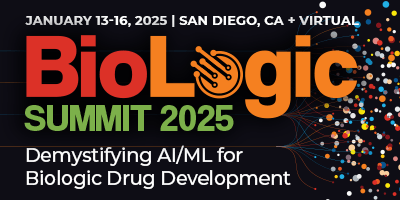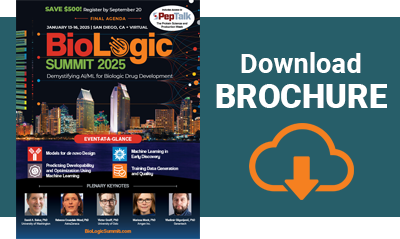Interactive Breakout Discussions
Engage in in-depth discussions with industry experts and your peers about the progress, trends and challenges you face in implementing ML/AI in your work! Interactive discussion groups play an integral role in networking with potential collaborators, provide an opportunity to share examples from your work, and allow you to be part of a group problem-solving endeavor.
These will take place IN-PERSON ONLY.
Machine Learning in Early Discovery
Tuesday 4:15 PM- 5:30 PM
TABLE 1: The Transition of Experimentalists into a Computational Paradigm in Pharmaceutical R&D
Moderator: Qing Chai, PhD, Executive Director, Eli Lilly & Company
- Addressing skills gaps
- Benchmarking progress compared with traditional structures
- Best practices for collaboration between experimentalists and data scientists
- Examples of successful transitions
- Implementing models/tools and workflows based on AI/ML approaches
Models for de novo Design
Tuesday 4:15 PM- 5:30 PM
TABLE 2: How Open Competitions Provide Valuable Benchmarking to Novel Technologies
Moderators: Andrew R.M. Bradbury, MD, PhD, CSO, Specifica, Inc., a Q2 Solutions Company
Matthieu Schapira, PhD, Principal Investigator, Structural Genomics Consortium, Professor, Pharmacology & Toxicology, University of Toronto
- Why benchmarking is needed
- Designed competitions, and accidental ones
- Lessons from CACHE
- The AIntibody competition to assess computational methods in antibody discovery
TABLE 3: The Use of Tools for Building Gene Editors for Going Beyond Proteins
Moderator: Jeffrey Ruffolo, PhD, Head of Protein Design, Profluent Bio
TABLE 4: AI-Driven Biologics: Accelerating Discovery, Overcoming Challenges
Moderator: Per Greisen, PhD, President, BioMap
- Motivation: The urgent need for novel biologics is driving the exploration of AI in drug discovery
- Focus: AI's potential in accelerating biologic drug discovery, particularly de novo antibody design
- Showcase: Successful AI-driven VHH and mAb designs
- Discussion: AI's strengths in predicting antibody structures, challenges in translating designs into functional molecules, achieving industrial-scale reliability, and closing the gap between computational and experimental results
Training Data Generation and Quality
Thursday January 16 11:30 AM- 12:30 PM
TABLE 5: Internal Data Generation and Curation
Moderator: Kevin Metcalf, PhD, Senior Scientist, Merck
- Amplification strategies
- Avoiding bias
- Closed-loop experimentation
- Controls and validation
- Dealing with skewed data
- Historical data
TABLE 6: Machine Learning in Biologic Drug Discovery: Leveraging External Data Sources
Moderator: David Noble, Data Scientist, A-Alpha Bio
- Quantity: Availability challenges, scaling laws, synthetic data
- Quality: Diversity, leakage, reproducibility, quality vs. quantity
- Collaborative data generation: Industry-academia partnerships, data sharing consortia
- Federated learning: Technical challenges, open-source foundation models
- Intellectual property: Data ownership, balancing openness with commercial interests
- Open-source data: Curation quality, integrating diverse sources with proprietary data
Predicting Developability and Optimization Using Machine Learning
Wednesday January 15 5:10 PM-6:00 PM
TABLE 7: Applying AI to Improve Manufacturability and Developability of Multispecific Biologics
Moderators: Mahiuddin Ahmed, PhD, President and CSO, VITRUVIAE
Jeffrey J. Gray, PhD, Professor & Research Mentor & Outreach Advisor, Chemical & Biomolecular Engineering, Johns Hopkins University
- Improving humanization and predicting immunogenicity
- Reducing off-target binding
- Predicting aggregation, viscosity, and excipient formulation
- Combining targets for improved efficacy
Thursday January 16 11:30 AM- 12:30 PM
TABLE 8: AI/ML-Driven Design of Conditionally Active Molecules
Moderator: Hunter Elliott, PhD, Senior Director, Machine Learning, BigHat Biosciences
- What is the therapeutic potential of conditional activity and how do we best balance this against increased complexity and risk?
- What challenges are unique to ML-driven design of conditional molecules?
- How does the optimal ML toolkit vary between conditional and unconditional design?
- How best can we overcome challenges in data acquisition and availability?
- What are the currently tractable forms of conditional activity and what can we envision for the future?
TABLE 9: Practical Impacts of Machine Learning on Biologics Preclinical Pipeline
Moderator: Andrew B. Waight, PhD, Senior Director, Machine Learning, Discovery Biologics & Protein Sciences, Merck Research Labs












